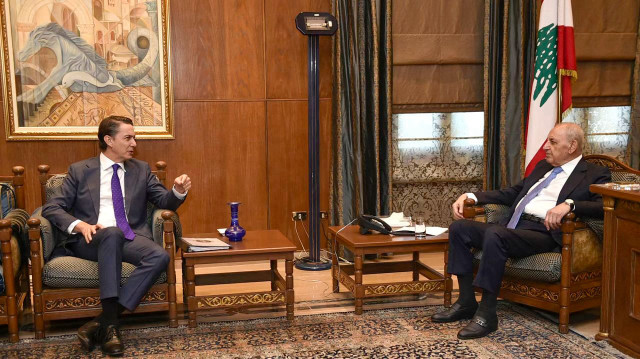
‘I came back because we have a real opportunity to bring this conflict to an end,' says Amos Hochstein
US envoy Amos Hochstein said Tuesday that a cease-fire agreement between Israel and the Lebanese group Hezbollah to end their conflict is “within our grasp.”
“This is a moment of decision-making. I am here in Beirut to facilitate that decision but it's ultimately the decision of the parties to reach a conclusion to this conflict. It is now within our grasp,” Hochstein told a press conference in Beirut following his talks with Parliament Speaker Nabih Berri.
“I came back because we have a real opportunity to bring this conflict to an end," he added.
The US envoy called his discussions with Berri as “very constructive.”
"Today we have had very constructive talks with Speaker Nabih Berri, and we have continued to narrow the gaps through discussions over the last few weeks,” he continued.
“I hope the coming days yield a resolute decision,” said Hochstein.
The US envoy is scheduled to meet caretaker Prime Minister Najib Mikati later Tuesday to explore the possibility of reaching a cease-fire between Israel and Hezbollah.
Hochstein is also expected to travel to Israel on Wednesday.
The US, Israel's main ally, is mediating between Tel Aviv and Beirut to reach a cease-fire deal to end more than a year of attacks between Hezbollah and Israel.
Last week, Berri confirmed that Beirut has received a US proposal for a cease-fire with Israel.
He, however, denied that the proposal “includes any kind of freedom of movement for the Israeli army in Lebanon,” a condition he described as “unacceptable” and non-negotiable. He reiterated Lebanon's refusal to compromise on its sovereignty.
Israel has been engaged in cross-border warfare with Lebanon, launching an air campaign against what it claims are targets of the Hezbollah group in late September.
More than 3,500 people have been killed by Israeli attacks in Lebanon, with nearly 15,000 injured and more than a million displaced since last October, according to Lebanese health authorities.
Tel Aviv expanded the conflict by launching a ground assault into southern Lebanon on Oct. 1 this year.

